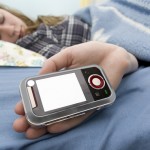 Hot off the newsstands this week is the latest issue of Mishpacha Jewish Family Weekly “Family First” section, with a feature story describing the experiences of some of those who chose to Unplug & Reconnect on Sunday, Oct. 2, the “Day to Disconnect.”
Hot off the newsstands this week is the latest issue of Mishpacha Jewish Family Weekly “Family First” section, with a feature story describing the experiences of some of those who chose to Unplug & Reconnect on Sunday, Oct. 2, the “Day to Disconnect.”
The publication, which reaches more than 250,000 readers, reports that tens of thousands of hours were devoted to unplugging from technology on this one day, with participants spending that time reconnecting with the people and events that are meaningful to them. The initiative was conceived by Ohr Naava, a Brooklyn-based women’s organization, and sponsored by Ohr Naava and Unplug and Reconnect.
“From the start, there was a natural synergy between Unplug and Reconnect and . . . Day to Disconnect,” says Dr. Joseph Geliebter, founder of Unplug and Reconnect. “Unplug and Reconnect brought a greater emphasis on ‘reconnecting’ to the disconnect mission.”
While event organizers anticipated that businesspeople and teens would be the among the most “wired,” of event participants, they were surprised to learn that oftentimes it was young mothers who confessed to being the most plugged in, according to Mishpacha. “Many of them found cutting the tie to their cell phones surprisingly more liberating than constraining,” Mishpacha reported. One mother told the magazine, “I never thought of myself as too obsessed with technology, but evidently I’ve been stuck pretty deep. I was so excited to spend three hours with myself and my family and found myself happier those few hours and definitely more patient with those around me.”
Overwhelmingly, people pledged hours away from technology in pursuit of family activities – whether it was spending time with a spouse, children, grandchildren, parents, or grandparents. Poignantly, one father reported, “I played with my two-and-a-half-year-old son and for the first time ever, I gave him my full attention!”
Addicted to Technology
Many participants in Day to Disconnect recognized that they might be addicted to technology. One young man told Mishpacha that after disconnecting for four hours, he realized that his cell phone had become like “a drug, an addiction, one I can’t stop. Whenever I’m interacting with other people and my pocket vibrates, even if I don’t look into my pocket, I’m far more curious what e-mail, text, or [BlackBerry message] I just received than what the person I’m talking to is saying.”
Indeed, we’re so enamored of our cell phones that many of us even sleep with these devices under our pillows, the magazine noted. One young woman opted to disconnect from her cell phone at midnight, moving her cell phone far from her bedroom. “. . . When I woke up . . . I felt refreshed and invigorated, since I actually slept a full eight hours. No disturbing texts stealing my REM sleep, no vibrating phone beneath my pillow, just a deep revitalizing sleep,” she reported.
Still disconnected later that day, this same young woman discovered what organizers of Day to Disconnect had hoped participants would realize: “I found it’s possible to communicate without my communication devices,” she said.
 We’ve written before about the incredible popularity of phone texting, particularly among teenagers. So we were less than surprised when we heard about a growing phenomenon known as “sleep texting.”
We’ve written before about the incredible popularity of phone texting, particularly among teenagers. So we were less than surprised when we heard about a growing phenomenon known as “sleep texting.”


